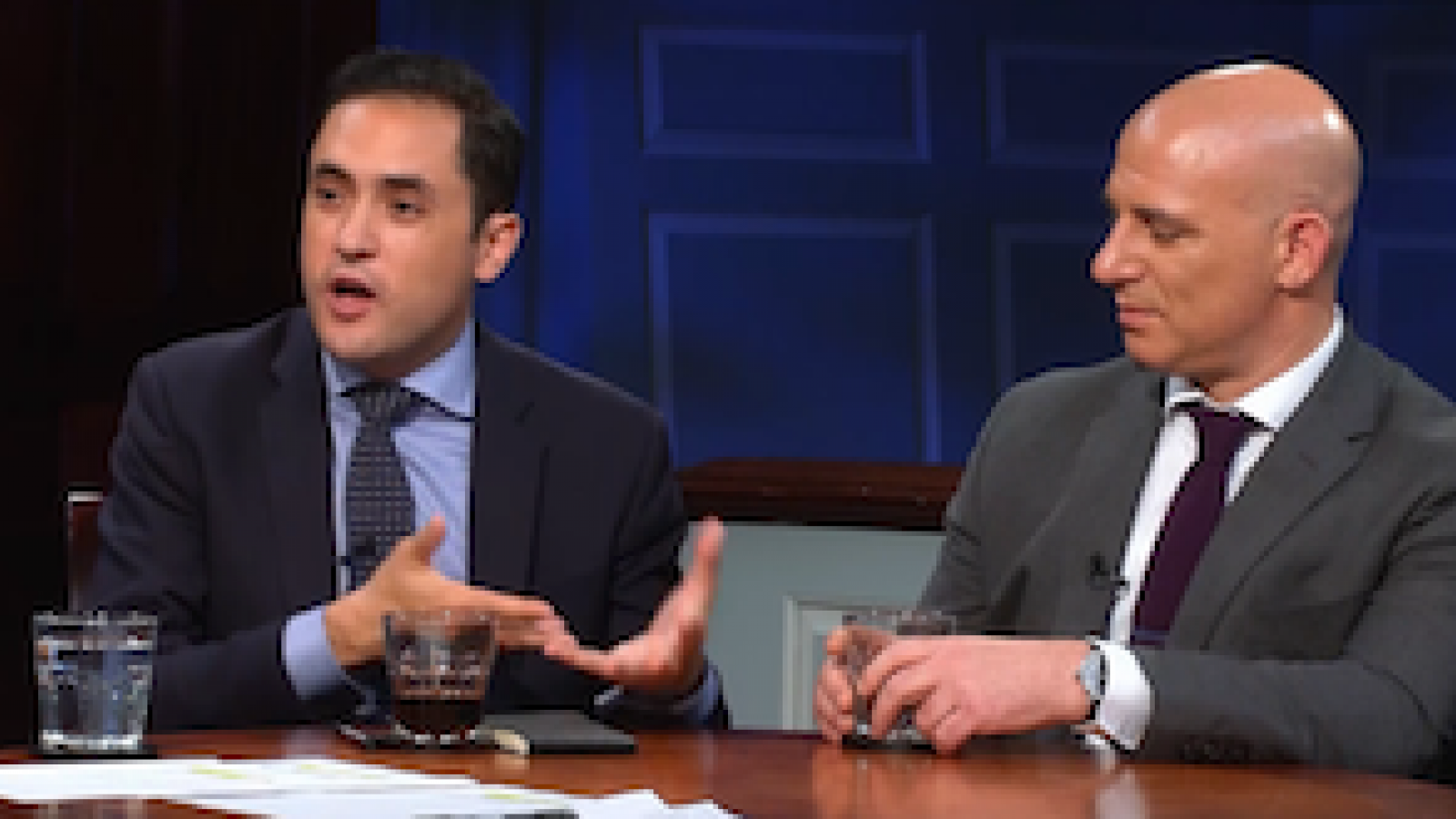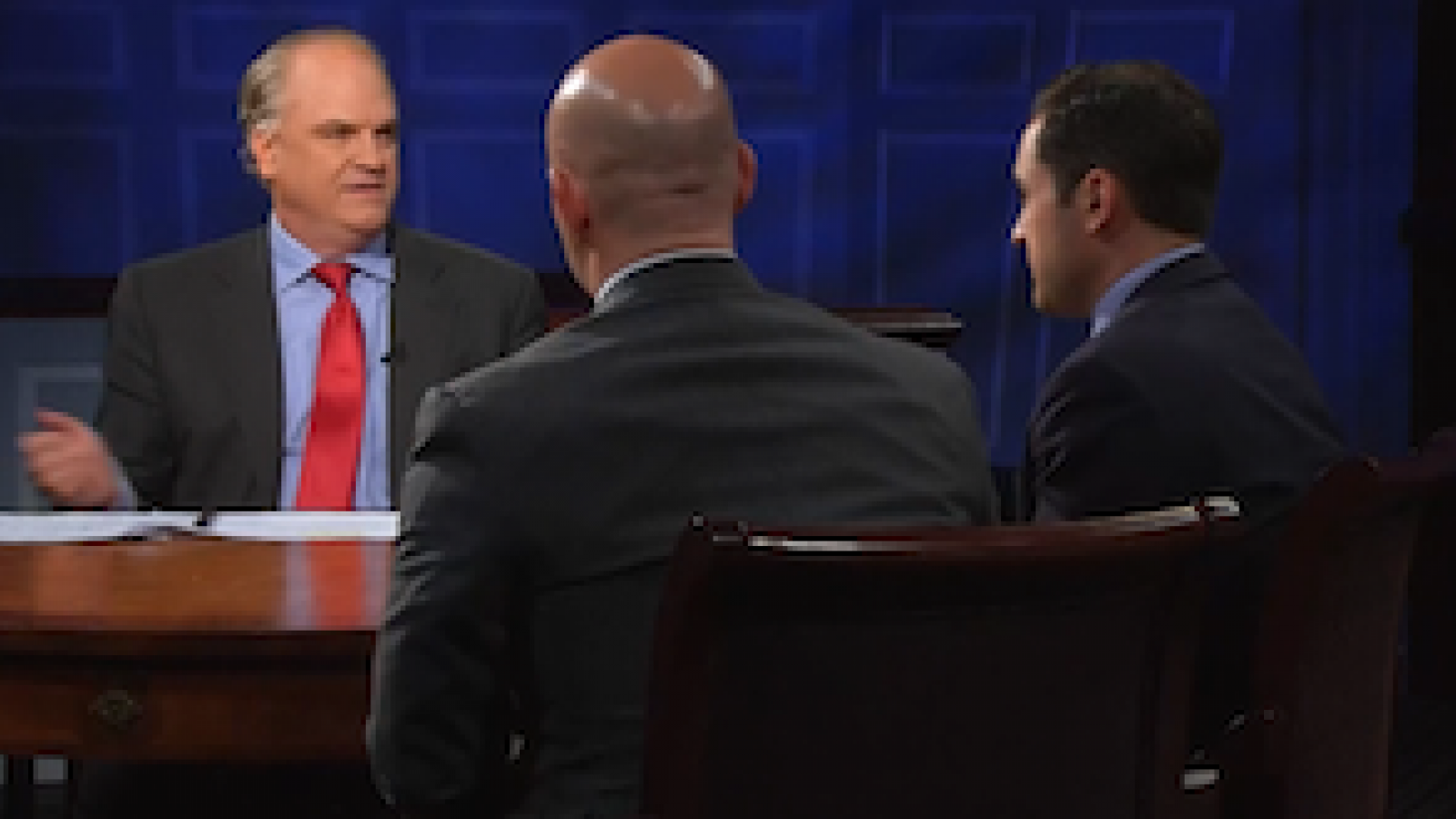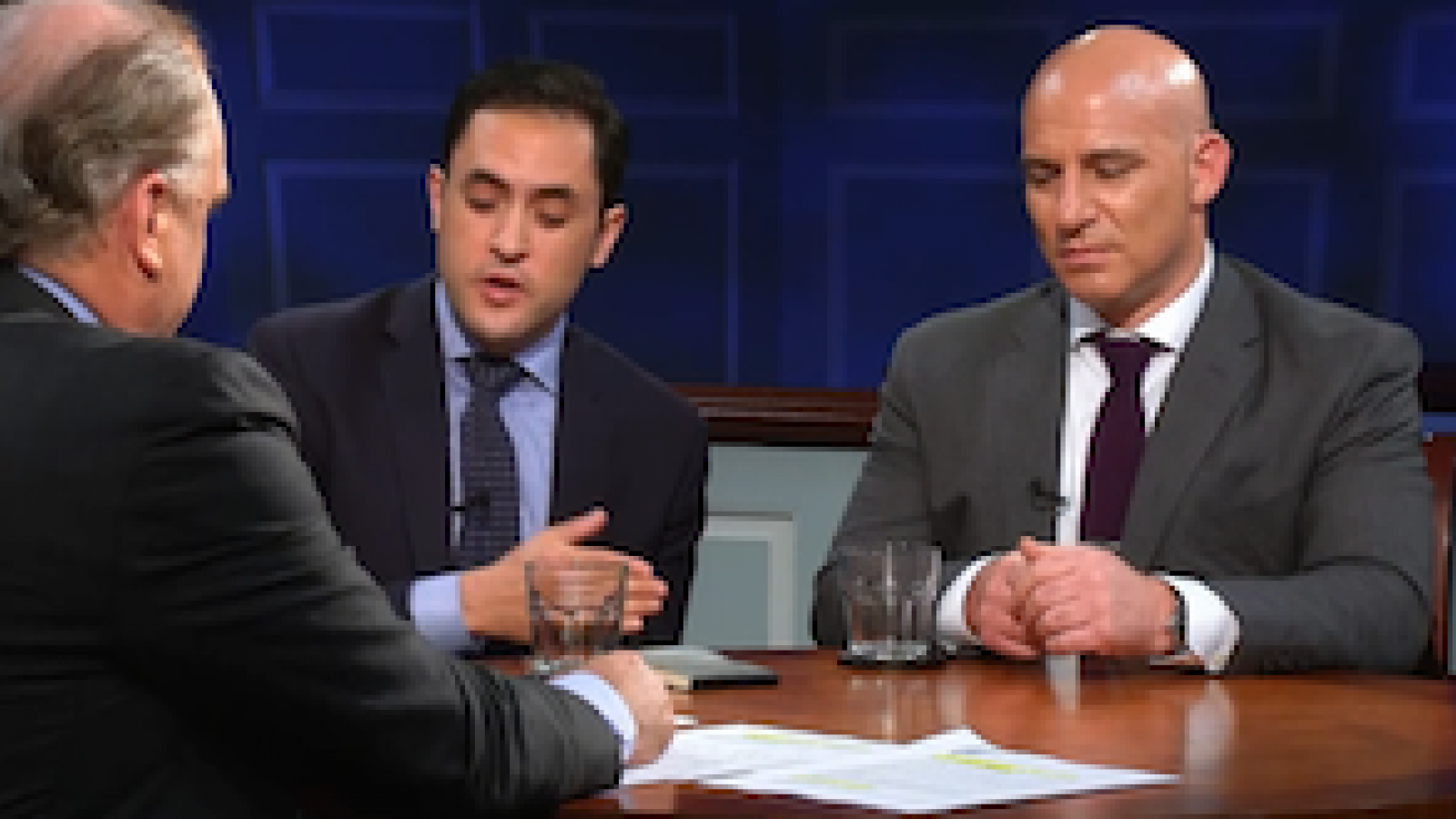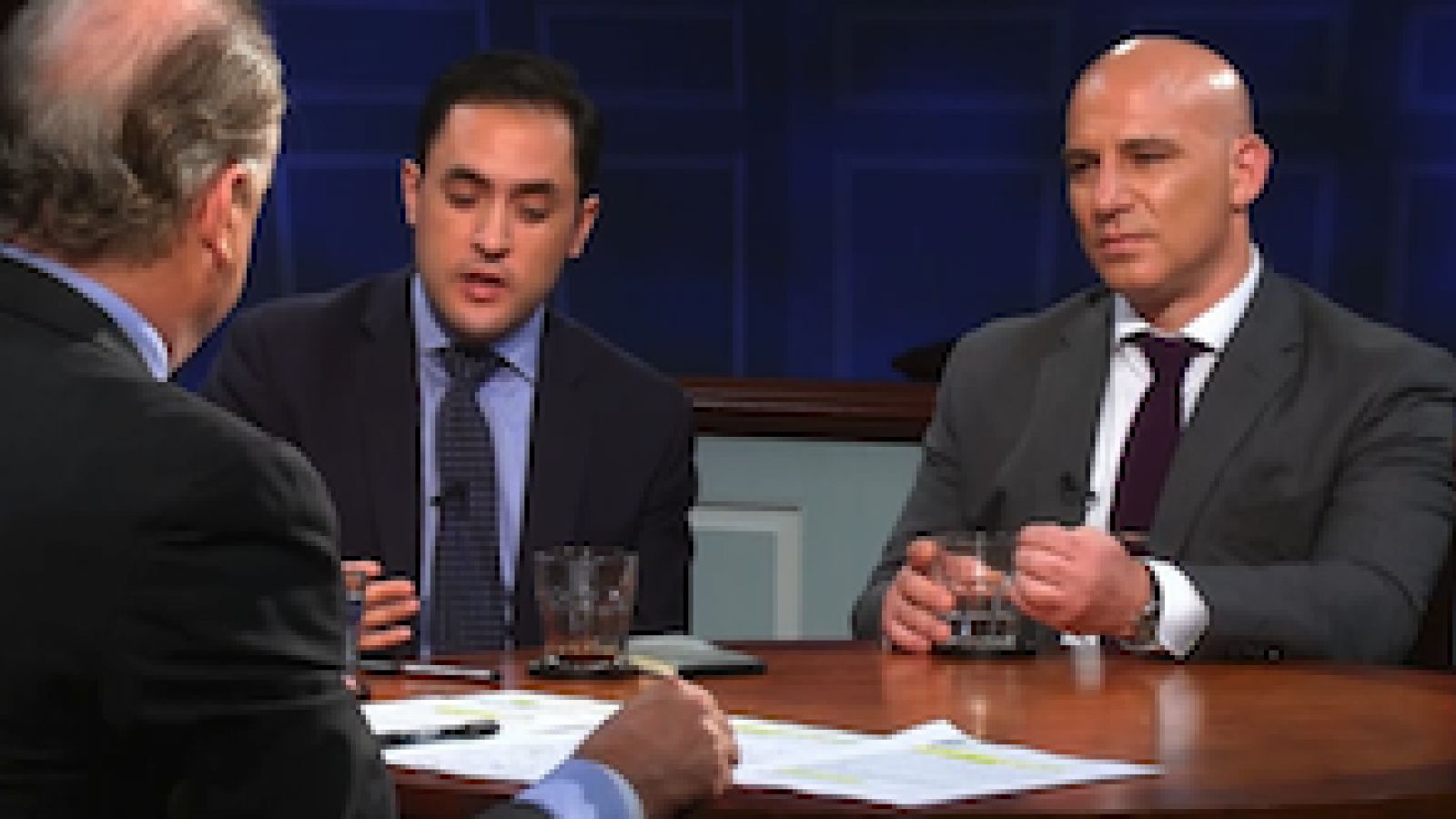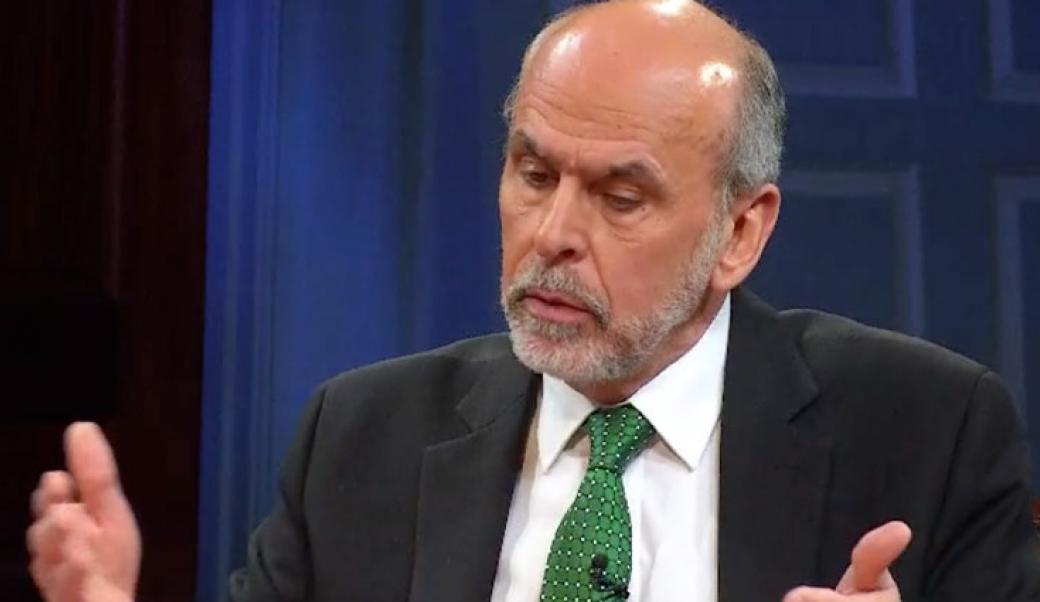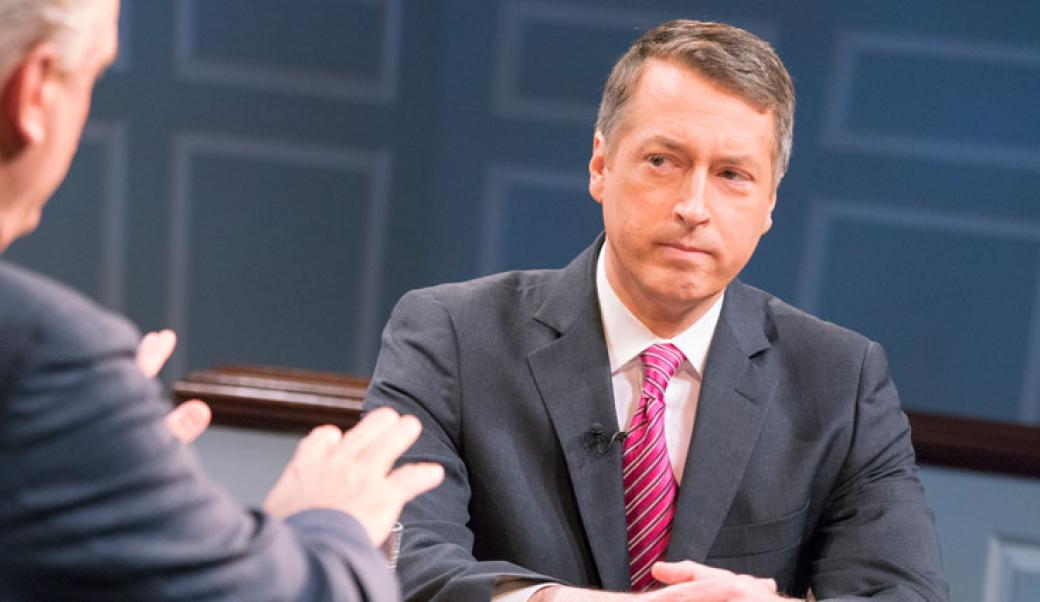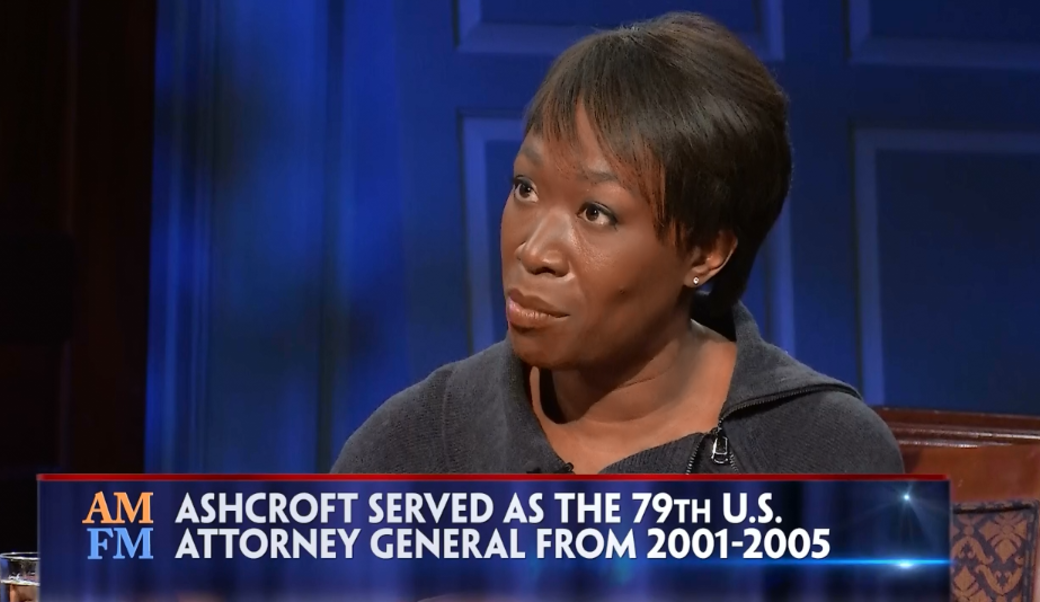About this episode
September 24, 2017
Michael Schmidt and Matthew Rosenberg
No media organization has been more targeted by the current White House than what President Donald Trump calls “the failing New York Times.” At the same time, Hillary Clinton has published a new book saying the New York Times and other media are largely responsible for her narrow defeat in the 2016 election. Both ends of the political spectrum see serious media organizations as their biggest enemies. So how does a democracy thrive in an environment where fundamental facts are in dispute? Our guests in this week’s episode are two New York Times reporters who have been at the center of this: Michael Schmidt, who wrote the first story about Clinton’s private email server, covers national security and law enforcement. Matthew Rosenberg covers intelligence and national security, including the firing of former FBI director James Comey and the investigation into contacts between Russia, the Trump White House, and associates of the president.
Media and the Press
The New Age of White House Investigative Reporting
Transcript
00:41 Douglas Blackmon: Welcome back to American Forum. I’m Doug Blackmon. No media organization has been more targeted for the wrath of the current White House than what President Donald Trump likes to call “the failing New York Times.” Meanwhile, Hillary Clinton has published a new book saying the New York Times and other media are largely responsible for her narrow defeat in the 2016 presidential campaign. She wrote, “They can’t bear to face their own role in helping elect Trump.” Both ends of the political spectrum see serious media organizations as their biggest enemies these days, and some polls show deep misgivings among the public about all media. How does a democracy thrive, or even sustain itself, in an environment when basic definitions of facts are so fundamentally in dispute? Our guests today are two New York Times reporters who have been at the very center of all this. Michael Schmidt is a Washington, D.C. correspondent covering national security and law enforcement for the Times and an MSNBC contributor, and he's the reporter who wrote the first story about Hillary Clinton’s private email server. Matthew Rosenberg covers intelligence and national security and spent 15 years as a foreign correspondent in Asia, Africa, and the Middle East. He's a CNN contributor, and over the past year, he's been one of the Times’ primary reporters on stories covering the firing of former FBI director Jim Comey and the investigation into contacts between Russia, the Trump White House, and associates of the president. Thank you for both being here.
Michael S. Schmidt: Thanks for having us.
Matthew Rosenberg: Thank you.
2:11 Blackmon: So, is The New York Times failing?
Schmidt: By the numbers we're not. We are more read than we've ever been. We have more online subscribers–and it's been a very important part of our success, is the online subscribership that we've built, which enables us–you know, we have millions of people paying us a month just to read us online.
2:35 Blackmon: But what about in the bigger picture? The–I think part of what the president's actually trying to suggest, in a metaphorical kind of way, is that the old system of how the truth was arrived at and how information was distributed is something that can't be relied on and it's a failure, and the failing New York Times is–he's really saying the failure of the whole system. Is it failing?
FACTOID: Trump coined “Failing NY Times” line during 2016 interview on FOX
Rosenberg: Look, there is–clearly, in the last 20, 30, 40 years in America been a declining faith in institutions. That applies to the media, as well. That's not entirely a bad thing, either. We do have a fairly raucous, very democratic kind of media environment at the moment. But I think right now, you look at stories we've broken during the election, going back to the email server and Hillary Clinton, going back far beyond that, and look at stories that we've broken about Trump. There are things that people today know about the president and what he has done in office they would not have known without the New York Times and without the Washington Post and a lot of other newspapers and news organizations. So, I have trouble seeing that as failing. Now, are they debating whether that's worth knowing, whether that's real or not? Absolutely. But that's kind of a good thing in some ways. I don't want to oversell it, but that's not a terrible thing. It's–I'm not so worried about the health of the media right this second.
3:54 Blackmon: What about Hillary's contentions on this? I mean, so the–on the same line, but that you have that Hillary Clinton, she's written in this book now and said very explicitly–it's not–doesn't put it all on The New York Times or all on Michael Schmidt for his original email server story. What's your reaction to just the–that sense that that's some other version of media having gone off the rails, and the New York Times specifically?
Schmidt: I think that we're an easy target. I think that we are a place that, when people are not happy with the way things are going, they can turn and blame us. And that's something that we knew, we signed up for, and what we do. We know that we're not part of the political movement in this country. We're part of the journalism, and that means that sometimes we're going to write stories that people don't like. Sometimes, we're going to push on things that people don’t like. We take it from both ends, and that's part of the deal. And we knew that coming into this and we know that going forward.
Rosenberg: It's worth pointing out, too, that there was an FBI investigation going into Hillary and her emails. We're not going to ignore that. That's never going to happen. She's a major presidential candidate. And there were moments throughout that where Hillary and her campaign were far, far less than forthcoming, and in some cases just outright obfuscated facts and–and ideas and issues there.
FACTOID: FBI inquiry into Clinton’s handling of secret emails began July 2015
And, you know, that's going to lead to more questions. That's going to lead to more press coverage. Hillary Clinton–and, let's be honest, Bill Clinton, when he was president, there were things that they just were not forthright about, and–things of their own personal lives, their own personal behavior that they sought to shut down conversations about, and that tends to fuel reporters' interest and reporting on your–on you. And, you know, so to blame us for that seems a little, you know–anyway, I could go on, but I won't.
5:45 Blackmon: You guys know as much about the emails, for sure–you know, let's start with that–as anybody. It is the case–am I right? As a reader? That in the end, the–that we still don't know what–exactly what the contents are of the email. There's supposedly missing emails that the Russians were unable to find for us during the but–
Schmidt: The FBI–the funny thing about the missing emails–there's sort of a misconception there–is that when Donald Trump says, "Russia, will you hack Hillary Clinton to get the emails?" The FBI has those emails. The FBI's been able to find them. The FBI spent an enormous amount of time recreating this server, going back using these super high tech things, and they're actually able to get a lot of the 30,000 emails that were deleted, and that kind of got lost in it–when Trump said that, that the answer is that they're down the street at the FBI. Now, some of those emails will come up through the FOIA process, the Freedom of Information Act through the State Department, and some of them were private ones that we'll never see. But the idea that there's all of these emails missing, I think, is probably wrong.
6:48 Blackmon: But so, given that, that there really aren't this vast number of missing emails, and what we do know about the ones that have been there all along and what we may know about these–it is the idea that buried in all of this, there are still revelations of some sort that would make us view Benghazi differently or that would speak to criminal conduct involving the Clinton Foundation. There's no reason to believe that any of those things are the case.
Schmidt: No, no. I–look, the–certainly the Benghazi issue has been investigated ad nauseum by many different–by the FBI, by several, you know, committees on Capitol Hill. So, that's–certainly on that end, no. I mean, is there always more to the story? Of course there is. The FBI did a year-long investigation on this, and Jim Comey stood up in July of 2016 and held his controversial press conference in which he said he did. In October of 2016, the FBI said, "Oh, man, there's something we missed." The FBI put so many resources into that investigation in that year. They tried to look under every rock, 'cause they knew everything would be scrutinized, and they still missed something. And, like, you know, historians know and–whatever. We'll never know the whole thing. And maybe in 10 years, we'll learn more and we'll have more insight into it, about why she created this server, why she did what she did, and have a fuller understanding of it and see it in the context of history. But for now, we know what we know.
8:12 Blackmon: And so, now let's–we've talked about Comey in this context, but now the other Comey story, of course, is the–ultimately, the investigation that he was leading as FBI director into the indications of Russian tampering in the 2016 election or–and possibly collusion and connections to the Trump people, campaign and such, but is there–how much of the story do we know? Do we know 10 percent? Do we think we know 80 percent?
Rosenberg: I probably imagine it's, like, five percent. That other 95 percent might be not as interesting as we think–we–because we don't know it–that we know the broad outlines, we know the broad arc. We know details at certain points. I'd also push back about how, you know, we have no direct evidence of any big kind of collusion. I don't know if there's ever going to be that, but we–there is a mounting amount of evidence of some degree of contact. I mean, we have an email from the president's son saying, "I'd love to see Russian government dirt on Hillary Clinton." Did they effectively collude? I don't know. But that email in itself says a lot about a willingness and an eagerness to at least discuss that possibility. And so, I think, you know, starting in the spring of 2016, you know, we know broadly that there were discussions within the Russian government about what to do and how far to go in the election, that at some point in the summer they said, "Let's go for it." Was it more about hurting Hillary than helping Donald? That's a debate, certainly within the intelligence community and others. We also know that, you know, they started to probe voter rolls and voting systems. That's what really alarmed the Obama White House, actually, much more than the hacking of emails. They saw that as espionage. The voting system is seen as something of a red line that shouldn't be crossed. We know that by mid-October, the Russians also thought Donald Trump was going to lose and had kind of given up on him, too. And so, you know, and then into December, January, we know that there were meetings at Trump Tower with the Russian ambassador and a Russian banker and Jared Kushner and Michael Flynn. We know that Michael Flynn talked to the Russian ambassador in December, right after the Obama administration imposed sanctions. And so, we do know a fair amount. But there are huge gaps that we're still trying to fill in, and who exactly saw who on what days and when. And I think, you know, one of the issues here is it's all classified. There's a lot of information that isn't public because it's classified. But there's also intelligence that's still coming in and has been coming in for months after the election, that intelligence isn't, like, a clean line. Like, something happens on Tuesday and you find out about it on Wednesday. It could happen on Tuesday and maybe there's a human source and you don't see that human source for seven months, so you find out about it in seven months. And it really is a very–kind of more of an art than a science, I guess.
Schmidt: We don't know what percentage 'cause we don't know what the full body is. And the–if you're Bob Woodward in the middle of Watergate, you don't know how it's going to end. You're kind of going through it, you're chipping away at different pieces. You're trying to see what that story is and trying to unravel it. FACTOID: Washington Post’s Bob Woodward broke “Watergate” story in 1972
Eventually, in the end, you know what the outcome is and history kind of puts it in a neat package and gives it to folks. And, you know, that's an important part of, you know, what–the presidential history that we've had. We're in the middle of it now. We're chipping away at different pieces of it, we're learning more. We're seeing the context of things. What does this little piece of information mean? What does this meeting mean? What–why was Comey really fired? What were the true motivations of the president? And we're going to chip, chip, chip, chip away at it and find the new pieces of information, present them in context, and move forward. And eventually, we'll have a bigger idea of what it is. But right now, we're kind of just looking up, trying to get through it. Remember, we're only seven months into his presidency and we are only a year after the FBI investigation started. It's still fairly early in the law enforcement world.
11:59 Blackmon: There’s some frustration among supporters of the president and the president himself that–why does everybody keep talking about these things that, even if Don, Jr. got this email, even if there was this meeting, even if there was some discussion that–about dirty stuff on Hillary Clinton, that's not necessarily a crime, that certainly doesn't, by itself, prove that the Russians threw the election. I'm paraphrasing them.
Schmidt: No, no, but I–just–I think I know where this is going. The problem is is that they've lied and covered up about this time and time again. Don, Jr., different–first of all, "No connections to Russia. Oh, wait, there was a meeting. We talked about adoption. Oh, no, this is what we really talked about"–as they were forced to. At every point, they have basically downplayed this, said there's nothing to be there, and then there's been disclosure after disclosure after disclosure. That is going to make people very suspicious. Why is it that they have struggled to tell the truth about that? I think that's why we stay on the story, that's why we continue to push. And I can understand why they're frustrated by it. It's a big cloud over this presidency, it clouds a lot of what he does. It has hurt him politically, it has hurt him in the polls, it has hurt people's trust in him. But they haven't necessarily been very forthcoming from the beginning about it.
Rosenberg: What is a smoking gun? I mean, there have been a number of people in this administration who, if they'd been in any other administration, would have been–they would have been disqualified from even getting their jobs. Michael Flynn, the national security advisor, is exhibit A in this.
FACTOID: Former U.S. Army Lieutenant General Flynn was Trump’s top military advisor
He was working a a foreign agent, a paid foreign agent of a foreign government, of Turkey, for the final three months of the campaign. They did it secretly. He never registered as he was supposed to, and then when–became the national security advisor and advocated policies that were really good for the people who were just paying him, you know? That is a relationship that is just beyond–it's not like we're pushing the boundaries or draining the swamp in Washington. That's just not–you know, that's not acceptable to most people in our country and in this government. And I think, you know, you've seen that time and again. And so, what's a smoking gun here? I mean, you know, you've got a lot of moments of, like, wow, you know? That's pretty amazing. You're sharing secret intelligence with the Russian ambassador and foreign minister in the Oval Office? You're bragging about firing the FBI director. These are serious issues. They're going to get covered.
14:25 Blackmon: You just referred to two specific stories that your byline was on along with other reporters. But in terms of sourcing and immediacy, maybe two of the very most remarkable stories we've seen out of this White House–of one, that in this first meeting between President Trump and the Russian foreign minister and the Russian ambassador to the U.S., first that he said to them–that he shared highly secret, highly classified intelligence information that might have–could have been used to–maybe was–to reveal the identity of a super-secret source or–use a non-technical term. But then, another story that your byline is on, that in this same meeting that he also said to the Russians that he fired Jim Comey to take the pressure off, because of this investigation. Now, in both of those cases, no getting around the significance of this story. I–that absolutely, that's information that's highly important and relevant. But also, a kind–would seem to signal a leak of–a betrayal of the president by someone among his own team, of a kind of staggering scale.
Rosenberg: I mean, look, so the way these meetings work is, you know, you'll get the Russian foreign minister's in there and the Russian ambassador. You got Trump, you got a few of–advisors, and there's a note taker in the room. Person writes notes. That note is then distributed throughout parts of the government.
FACTOID: Trump revealed ‘top secret’ intel to Russian officials in May 2017
So, dozens of people will have seen this. I think there are people who saw this and there are others in the administration, and they thought oh, my God, you've got the Russian ambassador, the Russian foreign minister in there. Who knows, like, you know, they could plant a bug, who knows what they could do? He's bragging about firing the FBI director to help end the investigation into Russia? And he's telling them intelligence that we got from an ally. We got it from the Israelis, and the Israelis wanted this kept so secret they said, "Don't even tell the British about this." And he's bragging to the Russians about it? And they thought to themselves, well, this won't stop. We need to expose this or it's not going to end, that there are things going on inside there that are so broken, the only last resort here is the press. And that's kind of how we find out about the things. So, yeah, there was absolutely a leak somewhere. I can't go much beyond saying that. But, you know, that is kind of the truest function of what leaks are for and what the press is for, is that final kind of layer of defense against malfeasance and wrongdoing inside the government.
16:45 Blackmon: I want to ask you guys just a–one very specific thing out of all this that relates to sort of deeper back end–all of these various stories intertwine at some point. But if we go back to the–what I view as the–sort of the turning point of the seriousness of these–of so many of these things, where it is that the–General Flynn, Mike Flynn is going to be the national security advisor, is the national security advisor–takes these–has these conversations with the Russian ambassador to the United States, that–and somehow–again, another perplexing thing–seemingly maybe doesn't realize that these conversations are going to be recorded by one or more intelligence agencies of the United States or others.
FACTOID: Flynn, Russian diplomat talked about sanctions in December 2016 call
But one would think that a military official of his stature and rank would be–have been aware of that. But he has these phone calls in which there is, in the end, a discussion about sanctions on Russia, related to Russian meddling in the 2016 election. He–or we know all this now. He urges that the Russians not have a dramatic response to the steps taken by the Obama administration, to give President Trump time after he's been inaugurated. This conversation happens, the very next day, President Putin comes out and says he's not going to–he's going to do essentially what Flynn had said–had suggested, whether it was because of that or not, we don't know. President Trump immediately applauds that announcement from President Putin. It seems impossible to me that General Flynn, having had those conversations and then that sequence of events occurring–that General Flynn would not have then had a conversation with President Trump in which he said, "You know, by the way, I mentioned that to the Russian ambassador"–would've wanted to have some degree of credit for what had been accomplished. Seems impossible that that didn't happen unless President Trump and General Flynn had had a conversation about doing it ahead of time. But one way or another, just seems impossible that there wouldn't have been some sort of communication about that.
Rosenberg: Yeah, there's a lot we don't know about that story, and that goes into that, you know, we don't know where this is going. I mean, look, what Flynn did wasn't actually illegal. And in some ways, it was a little beyond the norm, but you could've gotten away with that. That wouldn't have been so–okay, if it wasn't a denial–it didn't set the pattern that we've seen now since that time through the rest of the year, first seven months of the presidency, which is deny, deny, deny, "Okay, well, we did this, and let's move on." And, you know, that was ultimately what led to his–the official reason for his firing. And what the DOJ certainly believed is that his misleading Vice President Pence and others in the administration and the public had opened him up to blackmail and that, you know, the national security advisor, I think, is one of those roles that–I don't know people–everybody fully understands. You are in the West Wing. You have access to almost every piece of American intelligence. I mean, it is an incredible amount of access, and to think that, you know, suddenly the acting attorney general thinks this person's a blackmail risk is pretty–I mean, that's pretty extraordinary. And that pattern and that kind of unwillingness to say, "Hey, you know, this happened and here's why we did it," it–that's a pattern we've now seen a lot of, and it does raise questions. What are you trying to hide here? Was there something deeper? Did these contacts go back further? And we still don't know those answers.
20:14 Blackmon: There've also been two–generally two responses or interpretations to what all of this looks like. And, of course, the other key element of that sequence is that when the FBI goes and asks General Flynn about this, I think we know now that he responds in ways that the FBI considered to be untruthful, and so–
Schmidt: Well, we–less than forthcoming.
Blackmon: Less than forthcoming. And so, there's–it's possible that there's a criminal act there, depending on the exact interpretation of it. But the–some intelligence experts have said this has the markings of an orchestrated Russian intelligence effort, you know, that this was maybe not all planned out in advance, but an intentional effort to see how vulnerable people associated with candidate Trump might be to overtures that would–that could lead to their compromise. Other folks I've heard, know what they're saying, have been more skeptical of that interpretation. But just in terms of–I'm not asking you to say which it is, I mean, unless you have an opinion. But the–is it plausible–is it a plausible area of–you know, thread of inquiry of–that maybe, in fact, this was a specific Russian intelligence effort that appears to have compromised the White House? And, if so, that's a fairly–that's a pretty staggering development.
Rosenberg: I mean, it's really possible. The intelligence seems to indicate the Russians definitely wanted to develop people around Trump in the spring. And that doesn't mean those people were witting, you know? Flynn may not have–Flynn may have been totally unwitting in all of this. But I think the intelligence community's fairly confident that there was some kind of discussion and effort. How far the effort went, how successful it was, huge question still. But that effort was there.
Schmidt: And the other thing is that countries have to establish relationships with potential presidents and their advisors and incoming–after they're elected, during the–you know, up to the inauguration. And that is part of the deal. And there were meetings that the Trumps had and the Trump associates had with dozens of countries. So, the question is sorting out the nefarious from the regular, and that's what Bob Mueller's doing.
22:26 Blackmon: When you look at the media environment that we're in now and the kind of–there is this greater degree of hostility, I think it's fair to say, you know, toward reporters than at any time in our–in the–any of us can remember. A, is it–does that grind on you? Is that a wearying thing at some level, even though you try to sluff it off? Is there a degree to which that you wake up–and are you–you see some sort of commentary and you say, "Holy smokes, you know, do–why are–you know, why are we getting all this? Why doesn't anybody see the importance of what we do?" I mean, does it wear you down or does–or not?"
Schmidt: I think that this is a really time of extremes, because on one hand, there's that criticism. On the other end, there's the fact that we're more read than we've ever been, that we have more subscribers than we've ever had, that there's more encouragement. It seems more relevant to be a journalist than it's ever been. And that–that's different. So, that's encouraging. So, while there is a lot of criticism, there is a lot on the other side, and a lot of folks saying, "We really appreciate what you're doing. We think it's incredibly vital." People didn't always say that to us. They may not always say that to us. This may just be a moment for us. And that's fine.
Rosenberg: I completely agree with Mike there, that you–for all the–the hostility you get, you get a tremendous amount of encouragement. Personally, I like a good fight, too. So, if somebody wakes up in the morning, picks a fight with me, like, great, let's do it. You know, I do, though, worry that, especially when you have as big a bully pulpit as a president, you're getting up there and you're calling citizens of your own country who are doing their job, is a constitutionally recognized role–you're calling them sick, you're calling them un-American, we're just really–just not really people, that that is going to spur people to violence, that–you know, vast majority of people would never commit violent acts. But you only need one. Two or three, whatever it is–and that that kind of rhetoric is really dangerous and does kind of–maybe not put me or Mike personally at risk, but somebody in our line of work. And I think you've seen some of that already, where people–you know, an NBC reporter had to be escorted out of a campaign rally because Trump had so whipped up the crowd against her the Secret Service was afraid for her safety and that this will continue and this could get dangerous.
24:39 Blackmon: That's a fairly astounding fear, you know? That–I mean, after all these years of paying attention to other places in the world like Russia and others where it's dangerous to be a journalist and the Committee to Protect Journalists putting out statistics every year on what are the most dangerous places in the world–the idea that the United States has any degree of meaningful risk of becoming a place where it is physically dangerous to be a journalist, that's a–if that's actually something that is even slightly a possibility out there, that's a dramatic reflection on American society.
FACTOID: Committee to Protect Journalists says 48 reporters killed in 2016
Schmidt: Yeah. It's the times we live in. May you live in interesting time, as they say. [Rosenberg: Yeah.] These are quite interesting.
Blackmon: Interesting times indeed. Well, thank you guys both for being here. It's been a really fascinating conversation.
Rosenberg: Thank you.
Schmidt: Thanks for having us.
Blackmon: We hope you’ll come back for more episodes of American Forum, here on your local PBS station, or watch live tapings at the Miller Center Facebook page. You can reach me, if you've got a comment or a question, on Twitter @douglasblackmon. Mike Schmidt is @NYTmike, and Matthew Rosenberg’s twitter handle is @allmattnyt. See you next week.
